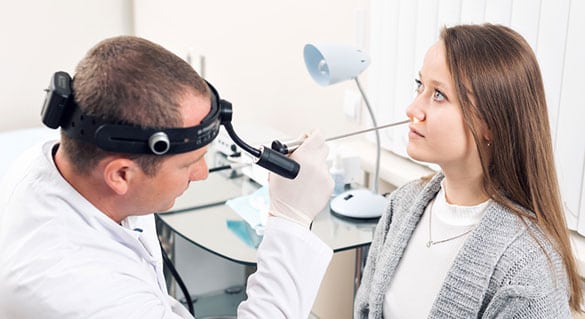
Nasal polyps are soft, sac-like, noncancerous growths that form in the nasal passages. They may occur alone or in groups. A nasal polyp itself is not painful, but it can create some uncomfortable and annoying symptoms that have a tendency to recur.
Typically, they occur in both nostrils at once. They vary in size, and hang from the nasal lining in teardrop shapes.
Causes of Nasal Polyps
The exact cause of nasal polyps is unknown, and they often occur for no identifiable reason at all. Even so, there are some factors that may put people at an increased risk of developing them. Any condition that causes inflammation of the nasal passages may make a patient susceptible to nasal polyps. Allergies, asthma, and aspirin sensitivity are all potential risk factors. Patients with cystic fibrosis may also be more likely to develop nasal polyps. There is some indication that a family history of nasal polyps may put a person at an increased risk, but knowledge in this area is limited.


Symptoms of Nasal Polyps
Nasal polyps are not themselves painful, but they do cause other complications that can include pain. They cause persistent congestion. Chronic congestion in turn can create uncomfortable pressure in the face and head. Headaches are common, along with soreness in the teeth or front of the face. A frequently runny or stuffy nose may be an indication of a nasal polyp. Excess mucous may run down the back of the throat, especially during the night. This is referred to as postnasal drip, and it can result in even more symptoms such as persistent coughing, hoarseness, and sore throat. Patients with nasal polyps may snore. Frequent sinus infections and a reduced sense of smell or taste are also possible symptoms of a nasal polyp.
Treatment of Nasal Polyps
A doctor can usually diagnose a patient with nasal polyps by way of a physical exam and a few questions. Some people with nasal polyps can get relief from their symptoms with simple medication. A corticosteroid may be prescribed to shrink or eliminate nasal polyps. This type of medication comes in several forms. It may be taken orally, injected, or in the form of a nasal spray. Other factors contributing to a patient’s nasal polyp symptoms will also be treated as necessary. This may include medication for allergies or treatment of any infections the patient may have.
Surgery is required for large polyps that do not respond to other treatments. Nasal polyp surgery is typically an outpatient procedure involving the use of an endoscope. An endoscope allows the surgery to take place without making any incisions on a patient’s face. Tissue from a removed nasal polyp is taken for analysis to ensure that there are no underlying medical concerns.
Usually, nasal polyps are not caused by anything serious. After surgery, patients are often given an inhaled corticosteroid to prevent a recurrence of nasal polyps. Recurrence of nasal polyps a few years after surgery is not uncommon.


